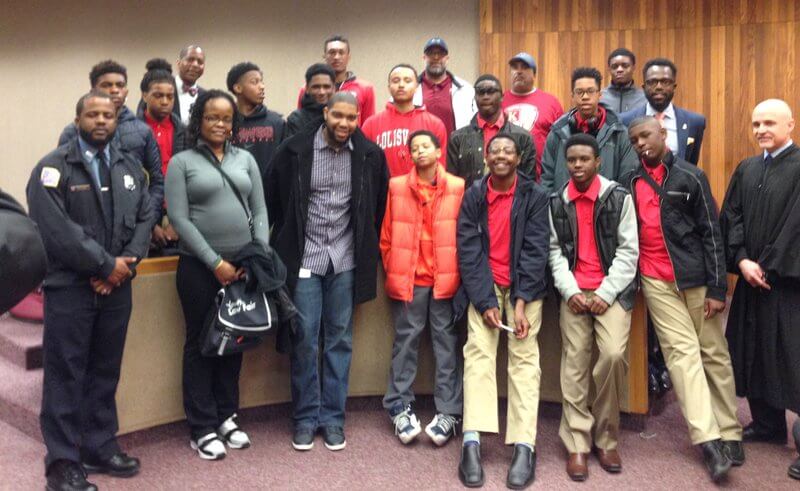
Lawyers for a Day at the Youth Law Fair
04 April 2015 Blog | Tags: youth fair
Last month, we organized a volunteer group to help out with the Youth Law Fair—a free, full-day, event that brings hundreds of high school students, lawyers, judges, and educators together to explore issues facing students in the DC area. Organized by D.C. Superior Court and the D.C. Bar, it offers students the opportunity to participate in mock trials playing the roles of prosecutors, defense attorneys, witnesses, judges, and jurors. The Youth Law Fair also offers speak-out sessions on racial profiling and building positive relationships with law enforcement, courthouse and holding cell tours led by judges and attorneys, and the chance to learn more about law-related careers. This year’s Youth Law Fair was titled Profiling: That’s Not Me! What’s The problem? and tackled the issues of racial profiling and police brutality. Our volunteers worked with a group of students assigned to the courtroom of Judge Hiram Puig-Lugo. We were joined by Officer Leo, a teacher turned policeman; Officer Leo played role of a police officer in the mock trial and afterwards spoke to the students about police work and the relationship between police and the public. For those scoring at home, the jurors rendered a split verdict.

Implicit Bias Resources
14 March 2015 Blog | Tags: racial justice
By Sara Jackson There is a wealth of literature available on implicit bias, and articles on the subject appear almost daily. The following is a non-exhaustive list of video, web, and print resources, some of which we used or referenced at our March 12 event. Videos Immaculate Perception?—Jerry Kang Ted Talk How to Overcome our Biases? Walk Boldly Towards Them—Verna Myers Ted Talk How I Learned to Stop Worrying and Love Discussing Race—J Smooth Ted Talk American Denial—Independent Lens film on Implicit Bias Online Resources Project Implicit ABA Spotlight on Implicit Bias Kirwan Institute for the Study of Race and Ethnicity: Understanding Implicit Bias Academic Articles Implicit Bias: A Primer for the Courts—Jerry Kang State of the Science: Implicit Bias Review—Kirwan Institute for the Study of Race and Ethnicity Trojan Horses of Race—Jerry Kang, 118 Harvard Law Review 1489 (2005) (Professor Kang’s original law review article on implicit bias and the Implicit Association Test) Implicit Bias in the Courtroom—Jerry Kang, et al., 59 UCLA Law Review 1124 (2012) The Id, The Ego and Equal Protection in the 21st Century: Building on Charles Lawrence’s Vision to Mount a Contemporary Challenge to the Intent Doctrine—Eva Paterson, Kimberly Thomas-Rapp & Sara Jackson, 40 Conn. L. Rev. 1175 (2008) (examines where implicit bias plays out in society and in the law, and discussed inroads for updating our jurisprudence to reflect modern social science) Recent News Coverage Is Everyone Just a Little Bit Racist?—Nicholas Kristof, New York Times Across America, Whites Are biased and They Don’t Even Know It—Chris Mooney, Washington Post When Talking About Bias Backfires—Adam Grant & Sheryl Sandberg, New York Times Blindspot: Hidden Biases of Good People —Matthew Hutson, Washington Post Sara Jackson is a member of our Board of Directors. By day, she is Pro Bono Coordinator at Georgetown Law’s Office of Public Interest and Community Service.
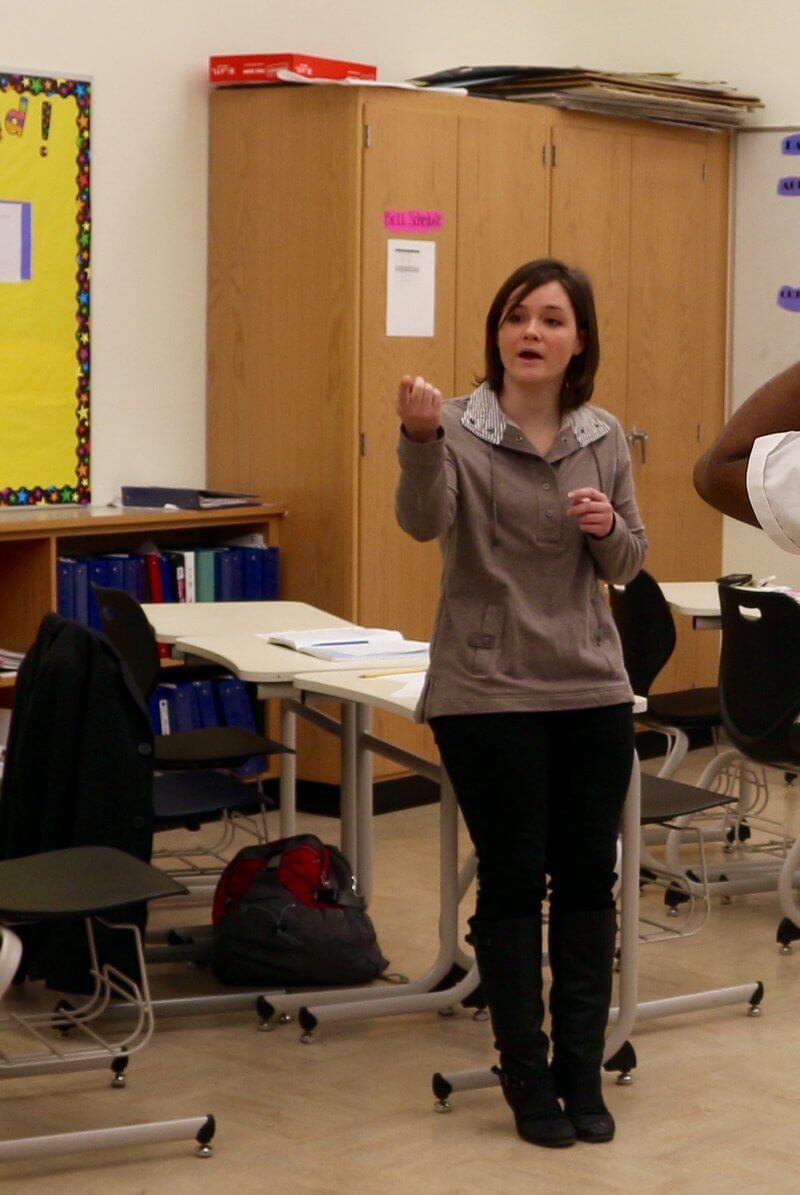
Georgetown Street Law Clinic at Anacostia High School
09 March 2015 Blog, East River of the River Profiles | Tags: street law
By Dominique Rouge Rachel Morris, a student in Georgetown University’s Street Law Clinic, stands in the middle of a classroom of high school students and asks them to stand up. She designates one side of the room as “yes” and another as “no” and begins to ask a series of questions such as: “Is it okay for the police to enter Bob’s house if they smell marijuana?” “Can the police arrest Bob if they received an anonymous tip that he is selling marijuana?” “Does reasonable suspicion allow the police to arrest Bob?” Rachel teaches at Anacostia Senior High in Southeast DC, which has an academic program specifically designed for students interested in legal issues. Georgetown Law students participating in the Street Law High School Clinic teach a two-semester elective course in practical law to students in fourteen high schools throughout DC —Rachel’s class is just one element of the students’ curriculum. The Street Law program uses the law and legal scenarios to help high school students develop academic skills such as reading, writing, active listening, oral expression, problem solving, and analytical thinking. The program also dovetails with the high school civics curriculum. Rachel engages the students by teaching practical applications of legal matters that they will find relevant. Although the students understand applications of basic legal terms like “warrant” and “reasonable suspicion,” Rachel comments that she hopes to improve the students’ ability to articulate their ideas. In Rachel’s case, she not only empowers students living in low-income communities by developing their legal vocabulary, but also exposes students to legal concepts and legal training they can apply in their communities and professional lives.

Racial Justice Update: The DOJ Ferguson Report
07 March 2015 Blog | Tags: racial justice
By Greg Lipper At the first installment in our Racial Justice Series, we talked about racism, recent events in Ferguson and elsewhere, and how lawyers can address these issues. This week, lawyers at the DOJ Civil Rights Division issued a lengthy, scathing report on law-enforcement practices in Ferguson. We’ve collected a variety of links to coverage of the report and its implications for the legal system: Release of the Report Investigation of the Ferguson Police Department – DOJ Civil Rights Division Ferguson Police Tainted by Bias, Justice Department Says – N.Y. Times The Gangsters of Ferguson – Ta-Nahisi Coates/The Atlantic Reactions in Ferguson… and Beyond Silence in Ferguson, and Defiance Elsewhere, In Wake of DOJ Report – St. Louis Post-Dispatch Ferguson Mayor Says Scathing DOJ Report ‘Not Proof’ of Widespread Abuses – St. Louis Post-Dispatch The Problem Is Way Bigger Than Ferguson, Justice Department Report Reveals – Huffington Post Ferguson’s Neighbors In St. Louis County Greet Damning DOJ Report With A Shrug – Huffington Post Reforming Ferguson Law Enforcement Policing Task Force Recommends Body Cams, Better Reporting, More Sleep For Officers – Huffington Post Some in Ferguson Who Are Part of Problem Are Asked to Help Solve It – N.Y. Times After the Justice Department Report, What’s Next for Ferguson? – Washington Post The Federal Government Probably Won’t Dismantle the Ferguson Police. That’s a Good Thing – Vox The Ferguson Court System Nixon calls for improving Missouri courts after DOJ report on Ferguson – St. Louis Public Radio Two Police Officers, Court Clerk Out at Ferguson Over Racist Emails – St. Louis Post-Dispatch Ferguson Judge Behind Aggressive Fines Policy Owes $170,000 in Unpaid Taxes – The Guardian Greg Lipper is our Communications Director. By day, he is a litigator at Americans United for Separation of Church and State. You can follow him on Twitter at @theglipper.
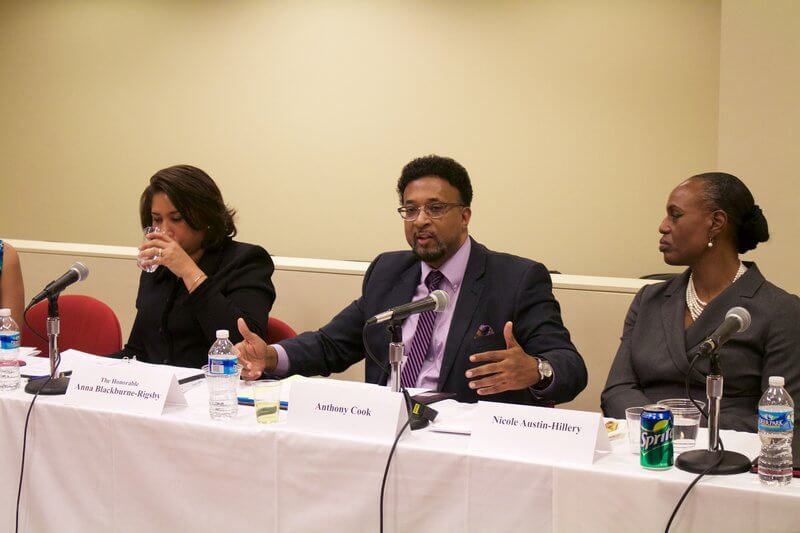
Racial Justice Recap: Ferguson, and the Need for Authentic Discussion About Racism
26 February 2015 Blog | Tags: racial justice
By Robin Murphy The recent killings of Michael Brown, Eric Garner, and Tamar Rice illustrate the continuing need for lawyers to commit time and energy to eradicate discrimination and violence against people of color and build an inclusive society that enables everyone to succeed. In the first installment of our Racial Justice Series, which we are cosponsoring with the National Legal Aid & Defender Association, we examined the events in Ferguson and explored how to address ongoing racism in the justice system. The panel was moderated by Camille Holmes, Director of Leadership and Racial Equity at the National Legal Aid & Defender Association. Each of the panelists brought has significant experience and expertise in the areas of civil rights and racial justice, and each brought unique perspectives to the discussion. Judge Anna Blackburne-Rigsby (DC Court of Appeals) described the need for all participants in a democracy to be informed and engaged. She recounted how racism is imbedded in our justice system, dating back to the Constitution’s Three-Fifths Clause and the Supreme Court decisions in Dred Scott v. Sandford and Plessy v. Ferguson. Judge Blackburne-Rigsby also shared her recent experience with the DC judiciary, as judges examined their own implicit biases and discovered the need for greater self-examination. Nicole Austin-Hillery (Brennan Center for Justice) likewise explained how many discriminatory policies are rooted in law, pointing to the disproportionate representation of black males in our prisons and the severe collateral consequences of a criminal conviction – such as the loss of the right to vote, to public housing and access to student loans. She added some good news: there is true reform occurring on Capitol Hill, with several bipartisan bills seeking to reform prison and sentencing. Georgetown Law professor Anthony Cook urged participants not only to think about the traditional roles of lawyers, but also to be disruptive. He pointed to the effectiveness of recent demonstrations around the country – including at Georgetown Law – such as die ins, teach ins, and black-lives-matter demonstrations. These and other efforts are essential to what he described as “bias interruption” – stopping bias from harming people of color. Each panelist stressed the need for more authentic and honest conversations about race and racism. The panel ended with an invitation to each attendee to choose an action that could advance that conversation – from understanding our own implicit biases to interrupting that bias to engaging in analysis and multi-layered strategies to address the structural system of racism. You can get more detail about the panel – including tweets, photos, and links to many of the cases, events, and studies discussed – by checking out our Storify of the event. We’ll be scrutinizing the concept of implicit bias at the next installment in our Racial Justices Series. This event – Below the Surface: Exploring Implicit Bias in Ourselves and the Legal System – is a hands-on workshop exploring implicit bias and how it may impact your practice, your workplace, and the legal system. Robin Murphy is a member of our Board of Directors. By day, she is a lawyer at the National Legal Aid & Defender Association.
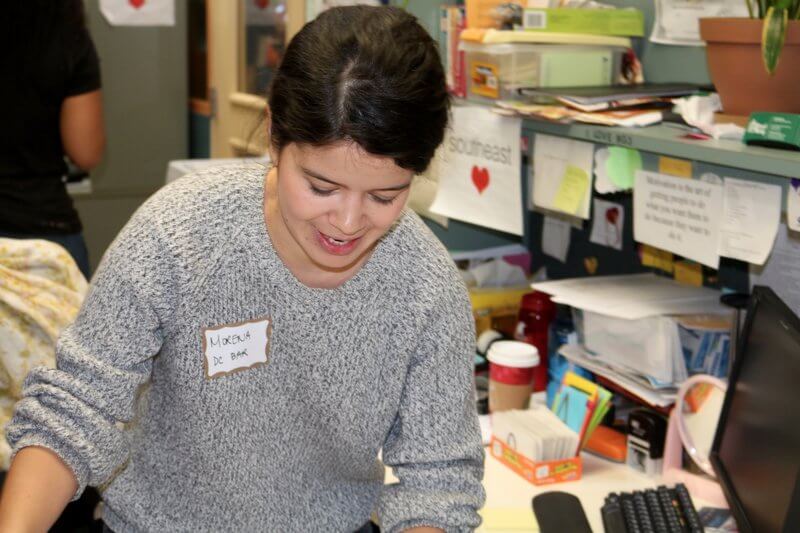
Service on a Saturday
14 February 2015 Blog, East River of the River Profiles | Tags: advice & referral clinic
By Dominique Rouge A group of lawyers sits around an oval table sipping coffee, tired like the early Saturday sky. Just as a silence has settled, a young woman walks in, arms full of clipboards. She fires out case descriptions, asking “who wants it?” Eviction, will settlement, medical malpractice, custody disputes, domestic abuse: a slew of poverty nightmares calls the lawyers to attention. Each stands up, takes a case, and walks downstairs to meet their client. So goes a typical morning at the DC Bar Pro Bono Program’s Advice and Referral Clinic, at which lawyers from all over the profession volunteer four hours of their time to give advice to drop-in clients living in poverty. The Clinic’s East of the River office, hosted by Bread for the City at their Southeast D.C. center, was packed with clients, both new and returning. The lawyers served 40 clients on the morning I visited. Some worked on viable cases with the volunteer lawyers; others waited in line to be told that their problem had no legal dimension. All bore the burden of a substantial, unexpected dilemma in their lives. The lawyers who work at the Advice and Referral Clinic on the first Saturday of each month do substantial, important work. No one lacked the comradery or assistance they needed, however. As clients cycled through the first floor, lawyers ran back up to the second floor to check in with mentors at the oval table. As they sipped more coffee and munched more bagels, attorneys from various fields counseled other attorneys on how to handle a case. As mentors created a sense of ease for lawyers, so too did lawyers for clients. Though the building was rushed and busy, I heard sounds of reassurance, confidence, and even laughter ring throughout. The cases clients brought to the Southeast clinic ran the gamut of subject and severity, yet the lawyers were alert to meet them with both knowledge and compassion.
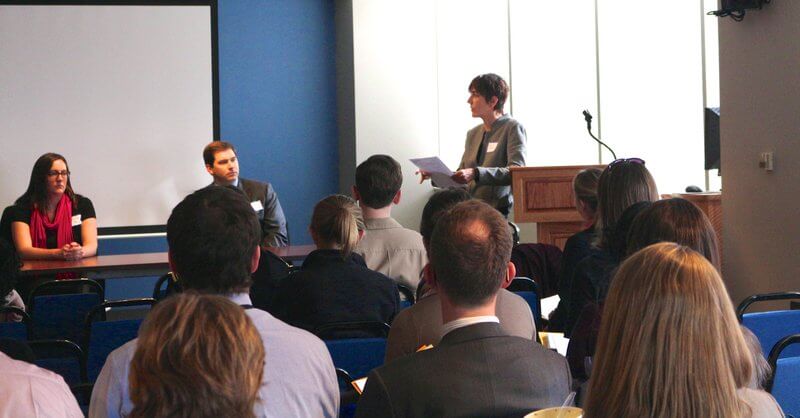
Government Lawyers, Meet Your Pro Bono Clients
17 January 2015 Blog | Tags: government
Government lawyers often hesitate to do pro bono work, since the navigating the ethics questions and potential conflicts can feel like too big an obstacle. But the federal government has made tremendous strides in helping government attorneys take pro bono cases, and DC’s legal services providers now provide many opportunities. On January 13, a lively bunch of government lawyers spent lunchtime at DOJ’s Patrick Henry Building to learn how to provide pro bono legal services to low-income DC residents. We convened this year’s Government Pro Bono Roundtable to encourage government attorneys to take the plunge and do pro bono work. Julie Abbate, a DOJ lawyer and a member of our board, moderated a panel featuring Joey Bowers (DOJ), Nicole Murley (also DOJ), Laura Klein (DOJ’s Pro Bono Program Manager), and Scott Risner (USAID). The panelists, who are pro bono veterans, shared tips for finding pro bono opportunities and explored ways to make the pro bono experience meaningful and productive. Among their suggestions: Seek out training: organizations like the DC Bar and, ahem, Washington Council of Lawyers offer many useful training sessions; Most legal services organizations provide a mentor to government attorneys taking on pro bono cases; Don’t be shy about letting your colleagues know that you are working on a pro bono case, and be sure to let your clients know that you have other cases and may not be able to respond to them immediately; If you don’t have the time to commit to a full case at the moment, consider a discrete opportunity like the DC Bar’s Advice & Referral Clinic. As it turns out, we’ll be leading a volunteer group to this clinic on the morning of Saturday, February 14. Finally, you can learn more at probono.net, which has a dedicated page for Federal Government Pro Bono Attorneys. Doing pro bono work can be invigorating. You get to learn about a new area of law and keep your practice vibrant. It’s work, of course, but it’s rewarding work. And it’s an ethical responsibilty. So if you’re a government attorney, we hope that a rewarding pro bono case is in your future! (We’d like to thank Red Velvet Cupcakery for providing cupcakes for the event. As it turns out, pro bono work is good for both the soul and the stomach.) Lydia C. Watts is our Associate Director. You can follow her on Twitter at @lydiawatts.
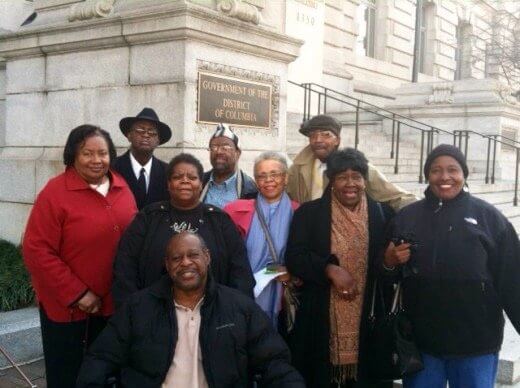
Another Win for Community Organizing
12 January 2015 Blog, East River of the River Profiles | Tags: community lawyering, transportation
By Aja Taylor (This blog post originally appeared on the Bread for the City blog, and is reposted here with permission.) In early 2013, Bread for the City’s Taylor Healy and I worked with a group of (very awesome) seniors at Victory Square Senior Apartments to get them a bus stop in front of their building. We organized them, helped them draft testimony and they kicked butt and successfully changed their access to a major transportation system (woot woot for systemic change! See the blog post here.). We worked with those same seniors to do some deeper training around how to self-organize and even took three of them to a WIN training to get EVEN MORE tools. They were incredibly engaged and eager to learn more about how to fight for themselves. This past November, residents from Mayfair (another housing complex in the Kenilworth neighborhood of DC) and an organizer/colleague from DCPNI, approached us about some changes that WMATA wanted to make to their bus route. Essentially, WMATA wanted to end bus service to the ONLY grocery store in the neighborhood (dumb!), and hadn’t really kept the community at large in the loop about the changes. Once residents found out, they wanted to do something. We talked to our Victory Square residents, had a couple of strategy sessions with stakeholders and leaders from each of the buildings in Kenilworth, DCPNI and the ANC, so that we could get a plan together. The residents organized a meeting with WMATA on November 13th where they turned out (after one week of work!) OVER 40 community members to a meeting where they told Metro their demands. Besides making flyers (shout-out to Andrew Lomax!), the professional organizers/lawyers took a back seat, and the residents really made sure that their voices were heard and their stories came through. They used the training that they’d received, and some tips from the pre-meetings, and they ROCKED it! Last week, WMATA’s top dog of bus planning sent a letter saying that they are recommending to the Board of Directors that none of the scheduled changes take place at this time. They heard the community loud and clear, and the community WON! THIS is what happens when you equip people with the tools and knowledge necessary to affect change for themselves and their communities. This wasn’t a bunch of paid organizers and lawyers making this happen, but it absolutely was a beautiful manifestation of our investments in these residents and this community. Changing a transportation system is HARD WORK–almost impossible–and in Kenilworth, they’ve kicked butt TWICE! WMATA is the largest single employer outside of the government in this area–a multi-billion dollar business–and it takes guts to go up against big money and fight. I’m just overwhelmed with pride right now, and I’m so thankful to end 2014 on this note! THIS is the sort of rock-star stuff the Community Lawyering project does. Whoohoo! Aja’s work is made possible in part through private funds awarded by the DC Bar Foundation.
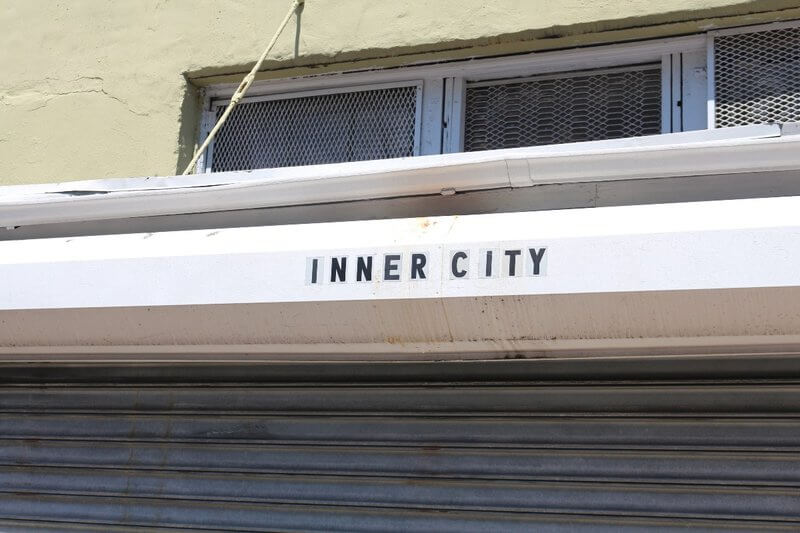
Instant Gratification
08 December 2014 Blog, East River of the River Profiles | Tags: elder law
By Mike Mazzella Instant gratification. That is exactly what Ebonee Avery-Washington gets from her job at Legal Counsel for the Elderly. “I’m arming them with knowledge,” Ebonee told me when I met with her to discuss her work East of the River. Ebonee’s mission as a legal associate for Legal Counsel for the Elderly is a simple one: to assist low-income, elderly residents of the District of Colombia with their everyday legal issues. The problems she helps resolve range from consumer issues to accessing public benefits. She travels all over the Northeast and Southeast quadrants, including spending time at Capital View Baptist Church and Bread for the City’s Southeast office. Each client is unique, and each problem she handles requires an individualized approach. Recently, Ebonee assisted an elderly client who had problems with a home repair project. Her client was an 89-year-old woman looking to have the air ducts in her home cleaned. The client contracted with a company to clean the ducts, agreeing to pay more than a thousand dollars for the repairs. The company came to the client’s home, but the services provided were substandard and not performed as contracted. The company refused to come back to repair the work, and sent the client a bill. The client, shocked by the unwarranted charges, turned to Ebonee for help. Together the two contacted the company to challenge the unjust bills. “She was able to handle it, she’s a smart woman, but it was nice to lend her a helping hand,” explained Ebonee. Ebonee’s advice to lawyers and law students thinking of contributing their time and skills East of the River is to go for it! “Just do it! There are so many opportunities to learn and grow. The work is worthwhile, challenging, and gratifying. I have encountered a great deal of professionalism and high standards in my work with East of the River communities.”






